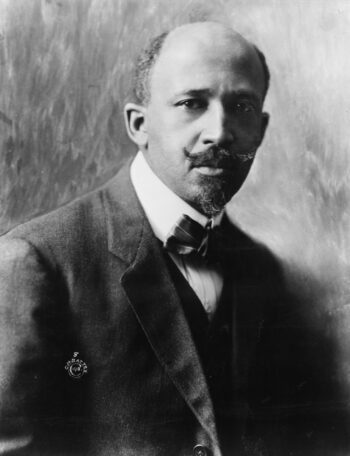
The new Humanist Heritage resource launched this week has revealed the forgotten history of humanism and humanists in the UK. New discoveries include fascinating details of the First Universal Races Congress, which was held in London in 1911, and was the first ever global summit organised to tackle racism, ‘with a view to encouraging between [those of different races] a fuller understanding, the most friendly feelings, and a heartier co-operation’. The Congress predated similarly-themed UNESCO conferences by four decades, but has long since been forgotten. Though enormously influential in the years prior to the First World War, very little has been written about it in the decades since. But now the Humanist Heritage project is set to change that.
New details of the Congress coming to light for the first time in over 100 years include the reaction of the American civil rights activist and humanist W.E.B. Du Bois, and the organising role of that era’s current, former, and future UK Prime Ministers. The Congress was also attended by such notable individuals as the Indian independence leader Mahatma Gandhi, and the social activist Annie Besant.
The Congress was principally organised by Gustav Spiller, a leader of the Union of Ethical Societies – which is today Humanists UK – in a bold attempt to challenge racism and encourage international understanding. The role of the three Prime Ministers have been forgotten about ever since, but the Humanist Heritage website reveals that the Congress’s Vice Presidents included then-UK Prime Minister H.H. Asquith, a Liberal; his predecessor Arthur Balfour, a Conservative; and future Labour Prime Minister Ramsay MacDonald. Asquith and Balfour were Christians but the Humanist Heritage project has also uncovered that MacDonald was a humanist who had previously chaired several congresses of the Union of Ethical Societies – the equivalent role today being President of Humanists UK. Stanton Coit, the founder of what is now Humanists UK, was another Vice President of the Congress.
Du Bois had co-founded the National Association for the Advancement of Colored People (NAACP) two years earlier, and was part of a large African-American delegation to the Congress. His reaction to it was recorded in The Crisis, the NAACP’s journal, but is now being unearthed for the first time since. He wrote:
‘It was a great day for humanity. It was a great day even in the light of the expected criticisms that the Congress accomplished nothing. It accomplished wonders. It met successfully in peace and concord and yet with unusual freedom of speech. It secured the co-operation of many of the leading people of the world and induced them to stand openly on its platform not simply of “Peace,” but of ”Good Will Toward All Men.” Finally it took steps toward the perfection of a world organization for interracial concord, investigation and co-operation. Every word uttered, every step taken by this Congress is in direct opposition to the dominant philosophy of race hatred…’
Another attendee was Charles Alexander Eastman, a Santee Dakota doctor and Native American rights activist. He wrote that the Congress was ‘the perfect equality of the races, which formed the background of all the discussions. It was declared at the outset that there is no superior race, and no inferior.’
Resolutions from the Congress included ‘To urge that the establishment of harmonious relations between the divisions of mankind is a prerequisite to any attempt to diminish warfare and extend the practice of arbitration… To emphasize that differences in civilization do not connote either inferiority or superiority… [and] To point out the absurdity of the belief prevalent among peoples of the world that their customs, their civilization, and their physique are superior to those of other peoples…’
Unfortunately, the Congress did not have the lasting effect it could have. Ambitious plans to take forward its work were shattered by the First World War. That in turn was followed by the Great Depression and then the Second World War. It was only in the aftermath of the Second World War and its clearly racist motivations that international efforts to tackle racism were able to begin anew. Du Bois later said that the Congress ‘would have marked an epoch in the racial history of the world if it had not been for the World War’.
Madeleine Goodall, the researcher behind the Humanist Heritage project, commented:
‘The Universal Races Congress was a remarkable achievement, so far ahead of its time. It is a shame that its legacy was shattered by the two World Wars and Great Depression, or else it would no doubt be remembered as the birthplace of the global efforts to eradicate racism that would have followed.’
Notes:
For further comment or information, please contact Humanists UK Director of Public Affairs and Policy Richy Thompson at press@humanists.uk or phone 020 7324 3072 or 020 3675 0959.
Read more about the First Universal Races Congress, its organiser Gustav Spiller, and attendees such as W.E.B. Du Bois and Mahatma Gandhi.
Visit the Humanist Heritage website.
Humanists UK is the national charity working on behalf of non-religious people. Powered by 100,000 members and supporters, we advance free thinking and promote humanism to create a tolerant society where rational thinking and kindness prevail. We provide ceremonies, pastoral care, education, and support services benefitting over a million people every year and our campaigns advance humanist thinking on ethical issues, human rights, and equal treatment for all.
In 2021, Humanists UK is celebrating its 125th anniversary with a renewed focus on its history. The new website Humanist Heritage is a rich new web resource that uncovers the untold story of humanism in the UK – a story of people, groups, objects, places, movements, publications, and ideas.
